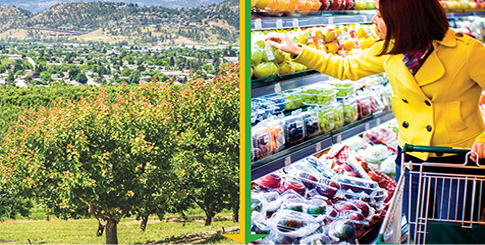British Columbia
British Columbia is Canada’s westernmost and third largest province, which spans from the Pacific Ocean to the Rocky Mountains. Home to 3,180 fruit growers, there were 24,147 cultivated hectares of fruit in 2016, with a total farm gate value of nearly $400 million.
The province is well known as Canada’s blueberry champ, supplying its residents and the country before exporting to the world. Blueberries are British Columbia’s top fruit export; it also ranks first in grape and cranberry production and is also a top producer of strawberries and raspberries. The southwestern portion of the province where most fruit is cultivated enjoys around 180 frost-free days each year, a sharp contrast to its northern reaches and neighboring provinces.
Additionally, British Columbia is home to a thriving tree fruit industry, with 800 growers operating orchards that generate $130 million in wholesale revenue each year. Most of these fruit orchards are located in the aforementioned southwest, in the Okanagan Valley. Although apples and sweet cherries are the province’s two largest tree fruit crops, growers also harvest pears, peaches, nectarines, apricots, and plums.
“In the Okanagan Valley, there’s tremendous production of apples and pears, and one of the best cherry deals in the world,” enthuses Karwacki. “In August and September, they’re some of the only sweet cherries in the world, and they are of fantastic quality.”
Greenhouse production is also big business in British Columbia. With 125 greenhouses, the province represented 23 percent of total farm gate value of Canada’s greenhouse vegetable sector in 2016, reaching over $300 million—second only to Ontario. The province’s primary greenhouse offerings are the usual: tomatoes, peppers, and cucumbers.
Vancouver, a bustling coastal city in the lower mainland region of British Columbia, is home to the Produce Terminal. Often referred to as the Old Malkin Avenue Market, the terminal was originally founded in 1948.
Yet, like many markets across North America, Vancouver’s produce terminal has continued to shrink in recent years as wholesalers move off the premises to newer, more expansive state-of-the-art certified warehouse facilities.
“The terminal market that once existed in Vancouver has kind of disappeared,” admits Karwacki. “Wholesalers were required to move into larger, very food safe facilities. I think that’s the trend in the industry, because everybody wants safe food.”



